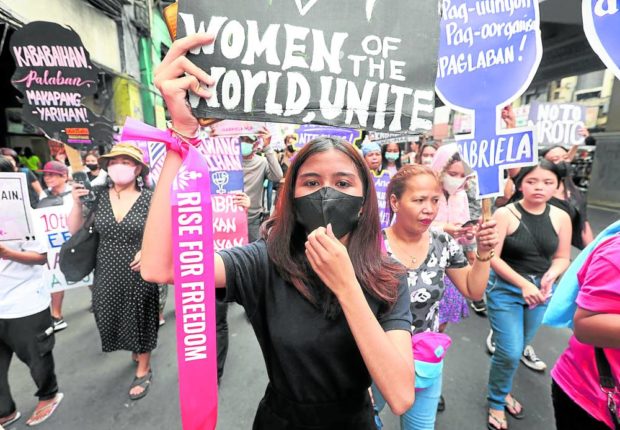
HER STRUGGLES | Groups led by Gabriela assert the role of women in charting the country’s sociopolitical and economic path, as they march to Mendiola in Manila to mark International Women’s Day. (Photo by MARIANNE BERMUDEZ / Philippine Daily Inquirer)
MANILA, Philippines — As the country marked International Women’s Day, women advocates and leaders said they were counting on the Marcos administration to help them regain lost ground, noting how the previous president had often spiked his public pronouncements with sexist remarks and anti-women rhetoric.
Their cautious optimism followed a somber assessment by United Nations Secretary General Antonio Guterres that the world was still “300 years away” from achieving genuine gender equality, as a protracted conflict in many parts of the world worsened maternal mortality, violence against women and children, and forced marriages, among others.
On Wednesday, advocates marking the occasion in Manila said they were seeing some “welcome developments” under President Ferdinand Marcos Jr., who has expressed his commitment to women’s rights through economic empowerment and more aggressive enforcement of laws against violence against women and children.
Women at the table
Vice President Sara Duterte, the highest-ranking woman in the government, said the government was willing to rise to the challenge of “investing in women” and in ensuring that the pursuit for gender equality “was not only a woman’s issue but also of men.”
As a keynote speaker in a Women’s Day celebration led by the UN, the Philippine Commission on Women (PCW), SM Foundation, and Aboitiz, Duterte said she had come to appreciate that “when women are at the table, they would have given more valuable insights.”
“We see now that when women in communities are given the opportunity to be productive, and when they are educated and empowered, and when they are honed to become leaders, they can change the fabric of society,” she said.
“We’re seeing things moving forward,” UN Women program coordinator Rosalyn Messina said in a later press conference. “We see a very welcome commitment from [Mr. Marcos] directly…including social protection, peace and security and ensuring there are more women in leadership roles and governance.”
Breaking stereotypes
These were small but marked improvements from Marcos’ predecessor, former President Rodrigo Duterte, who was notorious for anti-women and sexist rhetoric.
But improving women’s conditions doesn’t just involve undoing damage from the past administration “but how we’ve been dealing with women (historically), that we’re not giving them the voice they need to have and the respect they deserve,” Messina said.
For one, PCW deputy executive director Kristina Balmes noted, “there is still a lot that needs to be done. We must ensure that innovation and technology are maximized for gender equality, and that we do not leave women behind, and that women and girls are safe and secure.”
Citing statistics, Balmes noted that women are still more likely to be boxed into certain types of jobs because of unfair stereotypes, and are more likely to experience violence in their lifetimes.
Gender discrimination
Bataan Rep. Geraldine Roman said they were “taking their cues [from the president]and we’re pushing forward women’s legislation.”
At the center of this is the 23-year-old Sogie bill that punishes discrimination on the basis of sex, gender identity, or expression.
“It’s having a tough time right now, especially among conservatives,” Roman said, referring to the opposition of Church leaders or politicians linked to religious groups. “But I’m confident we have the numbers. People think that women’s rights are not compatible with LGBTQ rights, but both are gendered discrimination and go hand in hand.”
She said Congress is also pushing for a bill amending Republic Act No. 9262 to expand the protection of women and children against electronic violence.
They were also championing the passage of a “quota system” bill to improve women’s political participation. Patterned after Nordic countries, the bill hopes to increase women’s presence in political parties, Roman said.
Misogyny
Duterte had been criticized for making comments that were deemed offensive, sexist and misogynistic.
In 2021, he said the presidency was no job for women because “the emotional setup of a woman and a man is totally different. You will become a fool here. That is the sad story.”
He gave this reason to dismiss speculation that his daughter, now the Vice President, would succeed him.
In 2018, he called then Vice President Leni Robredo “incompetent” and unfit to run as president of the Philippines. He had also been called out for leering at Robredo’s knees.
Duterte also insulted Agnes Callamard, former UN special rapporteur on extrajudicial killings, when he said he would slap her if she investigated him and mocked her for being “thin” and malnourished.
He also referred to former International Criminal Court (ICC) prosecutor Fatou Bensouda as “that Black woman.” Bensouda initiated a preliminary probe of a complaint for crimes against humanity that was filed against Duterte in the ICC.
The former president maintained that he loved and respected women but that they—and his nitpicking critics—only misunderstood his statements.